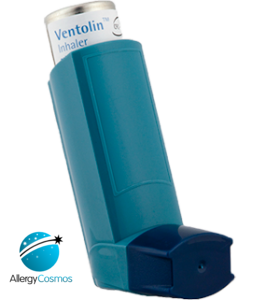Ventolin for wheezing symptoms is one of many potent allergy treatments. The key to managing allergy symptoms is, of course, avoiding exposure to your triggers. This might mean keeping an eye on pollen counts or air pollution forecasts or using an air purifier to remove indoor allergens. However, medication may also be an important element in your allergy self-management. Allergy symptoms are caused by your immune system as it over-reacts to a substance (the trigger/allergen) which is normally harmless. For instance, most people are exposed to house dust mite droppings all the time, but only those who are allergic to it will suffer from sneezing, coughing, wheezing and other symptoms. Therefore it is important to identify treatments or medication to combat the effects – it is advised that one of the medications to use in this example, is Ventolin.
What is Ventolin?
Ventolin is the trade name for salbutamol (also known as albuterol), an inhaler drug used to treat wheezing and shortness of breath in asthma; including allergic asthma and other lung conditions, such as chronic obstructive pulmonary disease.
How does Ventolin work?
Ventolin is a bronchodilator, it relaxes the muscles in the large and medium airways in the lung, which otherwise tighten up during an asthma attack; leading to symptoms of breathlessness and chest tightness. It is known as a ‘reliever’ – used specifically to treat (rather than prevent) symptoms. People with asthma may also be prescribed a ‘preventer’ inhaler which acts in a different way in order to stop symptoms occurring. A major benefit of Ventolin is its rapid onset – the airways will open up within 15 minutes, providing relief for two to six hours.
Who should take Ventolin?
This medication is only available on prescription and not over the counter. It is normally prescribed for people with asthma, including those with allergic asthma or asthma that is brought on by exercise. Doctors can advise Ventolin for wheezing symptoms too.
What else should I know about Ventolin?
You should be familiar with the correct technique for using an inhaler drug. As with all medication, ‘always read the label’, as Ventolin may have side effects and/or interact with other medication you are taking. If you have more questions about Ventolin, check with your pharmacist.
At a glance…
| Name of drug | Ventolin
(salbutamol) |
Benadryl
(acrivastine or cetirizine) |
Claritin (loratadine) |
Sudafed
(tablets; pseudoephedrine) (spray; xylometazoline)
|
| Purpose | Treating asthma symptoms | Relieving sneezing, runny noses, sore eyes | Relieving sneezing, runny noses, sore eyes | Relieving blocked noses |
| How it works | Relaxes airway muscles | Antihistamine | Antihistamine | Narrows blood vessels in the nose |
| Format | Inhaler | Tablet | Tablet | Tablets, nasal spray |
| Availability | Prescription only | Over the counter | Over the counter | Over the counter |




